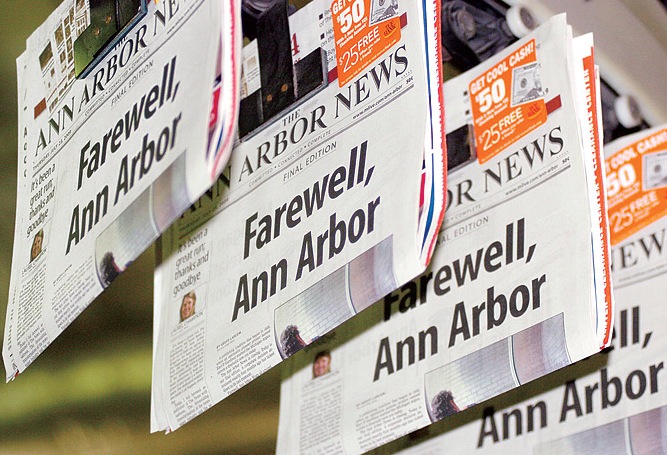Su Time di questa settimana c’è il racconto della prima città americana che non ha più un quotidiano locale, da quando la proprietà dello Ann Arbor News ha deciso di portare il quotidiano solo online. Il pezzo è scritto in modo scettico e corporativo, ma la storia c’è (complementare a quella del Seattle Times, che dopo la chiusura del concorrente P-I, sta andando bene: qui ne parla il New York Times, qui la traduzione di Repubblica). Poche pagine prima, più saggiamente, James Poniewozik ripete alcuni concetti che chi parla della crisi dei giornali dovrebbe avere bene in testa.
It’s possible, though, that nothing will save the journalism business — at least as we know it and pay for it today.
Journalists would be foolish, though, to think we can guilt people into buying our work in part to preserve our uniquely holy calling. (Try arguing that to a laid-off factory worker.) As with any other service, people will buy it or they won’t. Yes, news audiences will have to recognize that “free” information may mean more sponsorships and piper payers calling the tune. But journalists will have to accept that some members of our audience are, in fact, willing to make that trade-off, just as they live with product placement in movies.
Aggiungo anche alcune citazioni interessanti dall’articolo di Vanity Fair sul successo di The Politico (il sito di news sulla politica di Washington) che avevo segnalato qualche settimana fa. Una è sul luogo comune dell’autorevolezza dei grandi quotidiani, e sulle fragili fondamenta di ogni discorso sulla professionalità giornalistica.
The problem is not, for any of the three founders, merely that the newspaper business is broke, but that newspapers themselves, which so many people are arguing now need to be preserved, are busted: “The Post’s reputation was superior to its actual day-in-and-day-out achievement,” says Harris. “I don’t say that with any kind of malice. It’s not to disparage the Post, but it’s definitely true that a lot of the material was done with a shrug of the shoulder
Un’altra è ancora sull’ineluttabilità del cambiamento, e la futilità dei moralismi e delle nostalgie su ciò che scompare.
It is perhaps useless to argue whether this is good or bad. Rather, the world is as it is. And Politico seems like a pretty credible version of what the world will be: obsessives everywhere in their particular narrow-focused areas of interest (“silos” is the modern information term), flashing ever more information, ever quicker, in ever shorter bites—the shorter you can make it, the more information there can be—to all the ships at sea.



